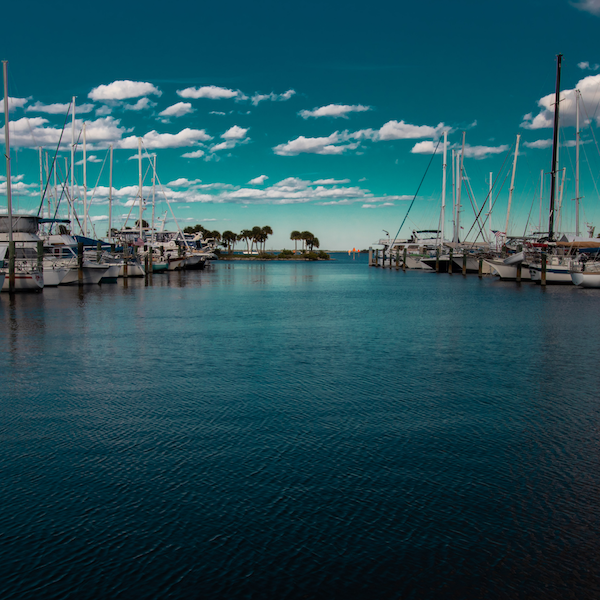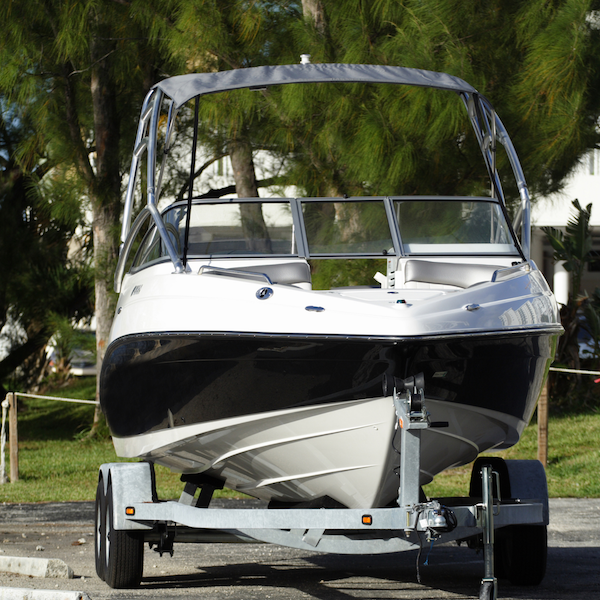HURRICANE PREPARATION FOR BOAT OWNERS
Tropical storms are extreme weather events that can cause major damage to boats. There are many things you can do to reduce the negative effects of the strong wind and heavy rain on your vessel. However, bear in mind that the infrastructure on land will also be affected.
Let’s answer some of the most common questions around hurricanes and boats.
What do boat owners do during a hurricane? Boat owners secure their boat as best as they can well in advance and then evacuate to a safe shelter on land.
Can you survive a hurricane in a boat? It’s not likely. Being on a boat during a tropical storm is very dangerous and should be avoided at all costs.
Where do boats go during hurricane season? They are either stored on land, in a safe marina, or in a hurricane hole. Some boat owners move their boats outside of a hurricane-prone area before the start of the season.
Now we’ll break down our tips for hurricane preparation, based on when you can act on them.
BEFORE THE HURRICANE SEASON
There are things you need to do in advance to prepare ahead of the start of the season.
Choose your insurance cover wisely
Getting coverage for hurricane season is getting harder and harder every year. Many underwriters have a long list of limitations. For example, your boat may not be covered in a specific area, or in a marina, or in certain months.
Weigh your options carefully - is the premium worth it? Will you be able to find a boat yard to lift out with short notice? Do you really want to stay (or leave your boat) in a hurricane-prone area? Where will you go on land if a hurricane strikes?
Whatever you decide, make sure your third party liability is valid in the event of a hurricane. If your boat is thrown onto a building, the damage will be extensive (and expensive).
Invest in extra gear
Don’t wait until the last minute to get the equipment you need to protect your boat - chances are that everything will be sold out by then.
We recommend carrying on board:
Spare strong dock lines
Lots of anti-chafing gear
Snubbers to absorb shock loading
Spare bilge pumps
Plugs to seal any holes in the boat, such as the one for the anchor chain
A satellite phone (phone lines may not work)
A torch.
Book a marina or yard
If you can, book a berth or storage space for the hurricane season in advance. Spaces are limited, so you need to do this well in advance.
Ask the company what their hurricane preparation involves - some yards strap boats down, while others have a limited number of keel holes. It’s also worth asking other boaters about their experience there during past hurricanes. If you choose a marina, agree on the berth’s position in advance; you’ll want to be on a well-sheltered dock.
Select hurricane shelters
If you don’t want to have the boat in an expensive marina or yard for the whole season, you need to come up with multiple plans.
For example, if you’re keeping the boat in a marina, can you lift out in the nearby yard? Is there a local hurricane hole where you can leave her? You need to have a list of potential shelters. If you plan to lift the boat out of the water, ask the boatyard if they typically have spaces left.
Make an inventory
Your insurance may require an inventory of the valuables you have on board. If you can, take pictures and videos of the gear to support a future claim.
DURING HURRICANE SEASON
Once the hurricane season begins, you’ll need to be alert at all times.
Keep a close eye on the forecast
Checking the marine weather forecast at least twice a day is common practice for boaters during hurricane season, especially if their vessel is in the water. Things can change quickly and hurricanes can be highly unpredictable.
WHEN A HURRICANE IS FORECAST TO HIT
News of a hurricane hit the mainstream news quite late. So it’s important you follow marine weather forecasts daily. This will give you as much advance warning as possible.
A few days before the storm is scheduled to hit, you need to take action, fast.
Trailer your boat home
If you can, simply pick up your boat and drive her home. Here, you will be able to secure her to strong trees or to the ground via concrete deadman anchors. You could even place the trailer in a garage. If your boat has an outboard, you can fill it with fresh water to help increase its weight.
Prepare the dock lines
Secure the boat to the dock using all the strong dock lines you have. Don’t forget to use anti-chafing gear on both ends of each line and to add snubbers. Allow for storm surge - don’t tie the lines too tight.
Remove all windage
To limit the action of the wind on the boat, take off any gear from the deck. This includes sails, solar panels, biminis, and more. Even heavy objects should be removed - these could get lifted to the sky and create damage.
Seal all holes
Hurricanes bring extremely heavy rains, which could flood a boat and sink it. To reduce the amount of water that can make its way into your vessel, seal all holes on board and inspect all hatches and doors for leaks.
Put out fenders
Fenders will reduce the amount of bumps and scratches the boat will take from the dock and other boats. Place them strategically.
Make sure the bilge pumps work
Even if you’ve sealed all holes perfectly, some water may make its way into the vessel. So make sure your bilge pumps are in good working order. Consider installing an extra pump or two for the event.
Test the batteries
For the bilge pumps to work, your batteries need to provide them with power. You shouldn’t leave the boat in a hurricane with flat batteries, if you can avoid it.
Check on the boat
Even if you’ve set up your boat to withstand any storm, it’s worth going to do a final check a few days before the hurricane arrives. The lines may have loosened, or a plug may have popped out. Checking that everything is in order will help your stress levels during the storm.
Pack your documents
If there are any documents on board, take them with you to shore. This includes the boat registration, your licence, the insurance papers, and more.
Leave the boat
Once the hurricane is near, you absolutely need to get off and find shelter on land. No boat is worth more than your life. It’s worth packing some food, water, and charged batteries, in case the storm causes extensive damage to the infrastructure. This is when having the satellite phone on you comes in handy.
IF YOU CAN’T AFFORD A MARINA OR BOATYARD STAY
Our advice is to leave your vessel in a safe marina or boatyard. However, if you can’t afford it, you can still keep your boat safe. Hurricane holes and 360-degree protected harbours offer good shelter from tropical storms.
When leaving your boat in such a place, you should follow the same tips we mentioned above. However, you should also set bow and stern anchors. You can tie to shore via mangroves or trees.
Remember: don’t go out to sea before or during a hurricane. It’s extremely dangerous and you won’t be able to outrun it. Get off the boat, even if it’s at the dock or in a hurricane hole, well on time to stay safe.



